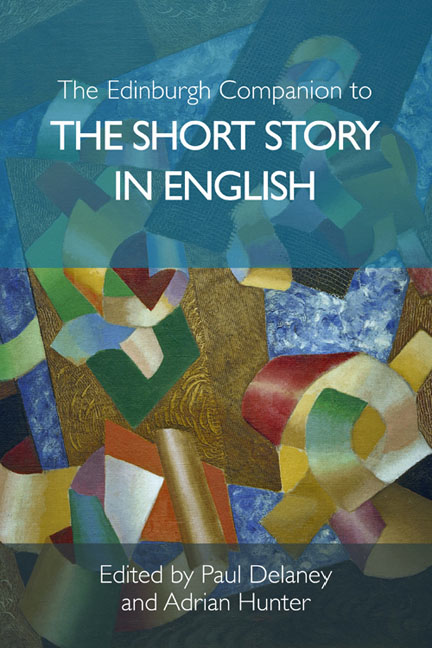Book contents
- Frontmatter
- Contents
- Acknowledgements
- Notes on Contributors
- Introduction
- Part I Historicising the Short Story
- Part II Publishing the Short Story
- Part III Forms of the Short Story
- Part IV Placing the Short Story
- Part V Identity and the Short Story
- 18 Gender and Genre in the Short Story
- 19 Diaspora and the Short Story
- 20 The Queer Short Story
- 21 Disability and the Short Story
- Index of Short Story Titles
- General Index
20 - The Queer Short Story
from Part V - Identity and the Short Story
Published online by Cambridge University Press: 18 December 2019
- Frontmatter
- Contents
- Acknowledgements
- Notes on Contributors
- Introduction
- Part I Historicising the Short Story
- Part II Publishing the Short Story
- Part III Forms of the Short Story
- Part IV Placing the Short Story
- Part V Identity and the Short Story
- 18 Gender and Genre in the Short Story
- 19 Diaspora and the Short Story
- 20 The Queer Short Story
- 21 Disability and the Short Story
- Index of Short Story Titles
- General Index
Summary
I was by myself, and I wanted to meet others like me. I couldn't go down the street saying: ‘I'm looking for lesbian friends’. So this was the only way I could think of to do it. That's why I started Vice Versa.
(Edith Eyde)IN THE DEBUT ISSUE OF Sodomite Invasion Review (1990), founding editor Don Larventz recalled the ‘heady days of gay liberation in the 1970s’, a decade marked by a ‘torrent of poetry, stories, novels, plays, essays and varied mixed forms’ that stood in marked contrast to the ‘previously silent’ eras. While acknowledging a great shift in Western attitudes – ‘celebrations where there was hostility and book fairs where there were locked libraries’ – Larventz also sensed imminent reversals: ‘growing government sentiment in favour of the censorship, remarginalization and exclusion of gay writing and images’ and, another ‘threat to the liberating effect of gay literature’, the corporate capitalist recuperation and assimilation of formerly gay communal imagery. Offering readers ‘pleasure and knowledge’, the stories, photography, essays and poetry of his ‘Magazine of New Writing’ – by predominantly Canadian and American male authors such as Alan Alvare, Tony Correia, Dennis Denisoff, Stan Persky, Felice Picano, Scott Watson and Wayne Yung – were positioned as resistance to everyday antagonists. In particular, ‘Sodomite Invasion Planned for 1990’, a 1988 headline from a Canadian fundamentalist Christian publication alerting British Columbians to an impending international gay and lesbian sporting event, galvanised the editorial board.
Vancouver-based Invasion (1990–4) is typical in many respects. Self-consciously political, volunteer-staffed, short-lived, and limited in reach and print run, its ancestors include Vice Versa (1947–8), nine issues edited pseudonymously in Los Angeles by ‘Lisa Ben’ (an anagram of ‘lesbian’), and Arena Three (1963–72), spearheaded by Londoners Esme Ross-Langley and Diana Chapman. Ordinarily featuring reportage and essays as well as stories and poems, the periodicals take as a given literature's role in liberation activism. There are notable generational differences among the publications, however, reflecting transforming mores. For instance, in 1947 ‘Lisa Ben’, a secretary in Hollywood, necessarily edited in secret; in the 1980s Edith Eyde revealed herself as the magazine's sole producer. Freely distributed in Vancouver, Invasion was readily purchased elsewhere in Canada.
- Type
- Chapter
- Information
- The Edinburgh Companion to the Short Story in English , pp. 328 - 345Publisher: Edinburgh University PressPrint publication year: 2018



